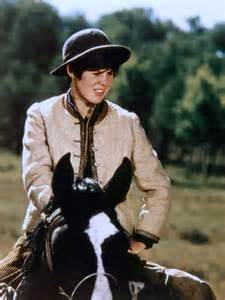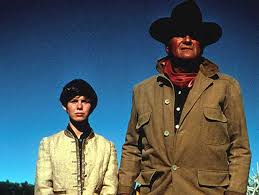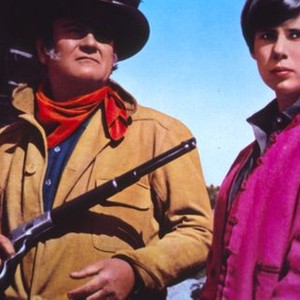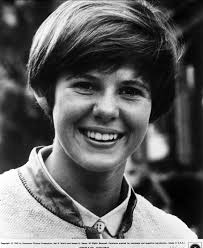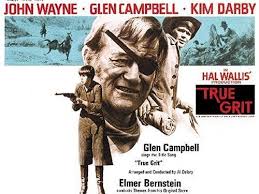|
home | what's new | other sites | contact | about |
||||||
|
Word Gems exploring self-realization, sacred personhood, and full humanity
Mattie and Reuben
Wikipedia: “True Grit is a 1969 American western film. It is the first film adaptation of Charles Portis' 1968 novel of the same name. The screenplay was written by Marguerite Roberts. The film was directed by Henry Hathaway and starred Kim Darby as Mattie Ross and John Wayne as U.S. Marshal Reuben (“Rooster”) Cogburn. Wayne won his only Academy Award for his performance in this film and reprised his role for the 1975 sequel Rooster Cogburn. Historians believe Cogburn was based on Deputy U.S. Marshal Heck Thomas, who brought in some of the toughest outlaws. The cast also features Glen Campbell, Robert Duvall, Dennis Hopper, Jeff Corey and Strother Martin. The title song, sung by Campbell, was also Oscar-nominated.”
Mattie: Who's the best marshal they have? [Mattie returns later to buy a pony from Col. Stonehill] Mattie: They tell me you are a man with true grit. Mattie: I'm here to take you back to Fort Smith and hang you! Mattie: They're in this story together. Now, I've got business across the river and if you interfere with me you may land up in court which you don't want to be. I've got a good lawyer in J. Noble Daggett. Rooster: Give me your cup. LaBoeuf: A little earlier I gave some thought to stealin' a kiss from you, although you are very young... and you're unattractive to boot. But now I'm of a mind to give you five or six good licks with my belt. Mattie: I have no regard for you, but I'm sure you have enough for yourself to go around. Rooster: [watching Mattie ford the river hanging on the back of her horse] By God, she reminds me of me! Mattie: Do you need a good lawyer? Goudy: [cross-examining Rooster] How many men have you shot since you became a marshal, Mr. Cogburn? Goudy: I believe you testified that you backed away from old man Wharton? Mattie: Now I know you can drink whiskey and I saw you kill a rat, but all the rest has been talk. I'm not paying for talk. I can get all the talk I need at the Monarch Boarding House. Rooster: Damn that Texan - when you need him, he's dead. [after LaBoeuf pulls Rooster and Mattie from the snake pit, he collapses off his horse; they go to him but it's too late] [arguing with Col. Stonehill]
Kairissi. Mattie and Reuben, at first glance, seem out of place in this collection of lovers’ case-studies. He was an older man; she's about 14. And there was no indication of any physical intimacy at all; in fact, there was often ill-will between them. Elenchus. Tell me why you think the author included their story here. K. These case-studies are meant to feature, for better or worse, different aspects of love. I’ll go out on a limb and say that not only do Mattie and Reuben picture something good about true love, but they just might be number one and right at the top of the list! E. I think you have everyone’s attention now. K. Well, let’s see if I can make good on my claim. E. It’s quite a claim for two who, as you say, had not a single lovey-dovey word between them – not one date, no walks under the moonlight, not even one embrace. K. It's just an example of what we called "the ludicrous proposition." Hugs and kisses, candy and flowers, heartfelt words and longing eyes, are the easy aspects of love. People get it backwards. John and Mary start with the fun part and never look to see if something more important is in place first. If you lack the proper foundation, then you’ll soon lose, or not bother to receive or request, the hugs and kisses and all the rest. But if you get the first part right, then everything else will eventually come, and then you'll make up for lost time rather easily. E. Where is this kind of hidden love in True Grit? K. To my way of thinking, the entire spiritual hinge and fulcrum of the movie is Rooster’s sudden awakening to the hidden person of Mattie, his astonished exclamation: “By God, she reminds me of me!” E. Ok, this is sounding interesting now, keep building your case. K. Notice how he invokes Deity. This is more than just cussed reference – it’s sacred realization! When a man discovers a woman who’s just like him, he enters a “dazzling darkness” sense of the mystical from which he shall not recover, in this world or the next. E. (silence) K. Rooster’s “open book of Revelation” is the universal cry of Everyman discovering his Twin Soul. “By God, she reminds me of me!” is exactly what Adam gushed, so effusively, when he first laid eyes on Eve. All this was discussed in The Wedding Song – but you know the Hebrew and what the author said as well as I do, Elenchus. E. Adam said, “You are bone of my bones, flesh of my flesh – that is, you remind me of me, in fact, you are me in another form.” So astounded was Adam by Eve’s coming that he commemorated the occasion by giving her a title, “Woman,” literally, “of the Man,” but, in context of Adam’s gushing, it means, “You are the one just like me!” K. Adam was so devastated to meet someone “just like me” that he couldn’t get over it, and wanted always to remember what he felt in those moments of mystical revelation – the moment when he met his Twin Soul. E. We should state, too, that Adam’s comment was more than, “I’ve searched the whole animal kingdom but now I find a creature of my species.” That’s not it, it's not just a dry clinical observation. We know it’s not it because after Adam “named” and surveyed all the animals, he fell into deepest despair of the prospect of being alone forever. K. Every man who shouts “By God, she reminds me of me!” had believed that he would forever be trapped within the solitary confinement, the prison, of his own aloneness: no one to share life with; no one to reach him; no one to love and from whom to receive love. E. We’ve spoken of ultimate reality as the ecstasy of finding one’s “bride prepared for her husband”; but Rooster's statement provides good implicit example of the converse, the “ultimate illusion,” the misery, of believing that his mirror-image mate doesn't even exist. K. It’s illusion because, as we’ve learned, the entire creation, addressing this very question, was engineered as a “system of halves” – with “the Adam,” female and male, created as Twins, beloved and lover, the grand expressions of this cosmic dualistic interplay. E. And so, Reuben, as son of Adam, as Everyman, suddenly is jerked into the realization that there is hope for him after all, that he is not alone, that there is someone who is as he is. K. The final scene of the movie speaks to the hidden love between Mattie and Reuben. They're about to part ways. He’s protected her from death, saved her life, and has now delivered her to her mother’s farm. They stand by the family burial plot, a stone’s throw from the house. Mattie speaks: “This is where Papa is buried. Mother will have a place next to him.” She continues briefly with a mention of other family members. But then, as expression of that which has been stirring in her young-teen heart, she reveals: “And here, in this spot, is where I shall be one day… and I would like you to rest beside me.” E. This final scene, “for those who have ears to hear,” is breathtakingly replete with meaning. This is not a burial ground for acquaintances, and not even for friends. This is sacred and holy ground reserved only for closest next of kin, for husbands and wives. K. To be buried together symbolizes to meet eternity together. She speaks in veiled terms, but in one voice with the poet Rilke: “You are my beloved – but I can reach you now only in infinity.” E. (deeply sighing)
E. Reuben first recognized feisty Mattie as “just like” himself, that blast of revelation, when she was on her horse, Little Blackie, as she struggled valiantly in a difficult situation. In that moment, he perceived her secret heart and character of “true grit.” K. Riding horses together with a teen-girl you don’t like very much is not a bad way to discover your Twin Soul, wouldn’t you say, buddy?
E. (small smile) "One would be as unpleasant as the other." K. (softly laughing) Oooooooooooo! K. Elenchus, about this subject of burial as symbolical of meeting eternity together -- do you think about this for us? E. I'll answer your question this way... I'm reminded of a Greek word, the meaning of which draws a useful distinction - "part versus whole." K. You like things like that. E. The word is synecdoche -- pronounced "sin-nec-da-kee." It refers to a part representing a whole. If we listen closely to what Mattie is saying, she's telling Reuben that his burial, and her invitation to a metaphoric final rest beside her -- ostensibly, a small part of one's story in this world, right at the end -- might represent an entire lifetime of love, that which, in their heart-of-hearts, suddenly realized, they meant to each other. K. Francesca did the same thing with her wish regarding cremated remains. E. It's what lovers do when there's no other way of communicating -- they enlist Death itself to testify on their behalf; it's a distress-signal to God and all creation declaring, "this is my only chance to proclaim what's in my heart." K. How terrible is this world of separation and loss. E. There's a song, "love changes everything -- how you live, and how you die..." K. ... and how you might strategize that a certain place, regarding the casting of one's remains, might reveal the greater message of one's entire life. E. It's synecdoche, "a part for a whole." What we do right at the end, if we've known true love, can transform and redistill the entire meaning of one's time here. K. Elenchus... I'd like your opinion on something about Mattie and Reuben... Do you really think a 14 year-old girl could be mature enough to recognize true love when confronted by it? E. Yes... I do; I think it's entirely possible; in fact, even younger girls might have eyes to see -- it's what women do in a natural way. But, regarding a certain other species more infirm, sometimes, or most often, even a 60 year-old man might not be ready. True grit is required to find Tom Chaney in the wilderness, but it's far more difficult to find one's true self in the open sunny air; rather, it's so easy that few will do it.
|
||||||
|
|
